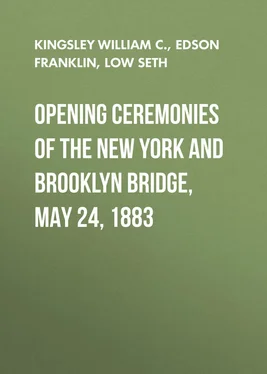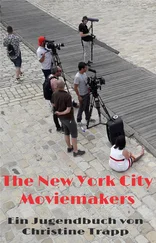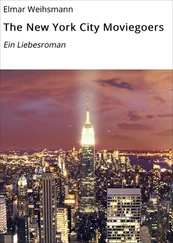William Kingsley - Opening Ceremonies of the New York and Brooklyn Bridge, May 24, 1883
Здесь есть возможность читать онлайн «William Kingsley - Opening Ceremonies of the New York and Brooklyn Bridge, May 24, 1883» — ознакомительный отрывок электронной книги совершенно бесплатно, а после прочтения отрывка купить полную версию. В некоторых случаях можно слушать аудио, скачать через торрент в формате fb2 и присутствует краткое содержание. Жанр: История, История, foreign_antique, foreign_prose, на английском языке. Описание произведения, (предисловие) а так же отзывы посетителей доступны на портале библиотеки ЛибКат.
- Название:Opening Ceremonies of the New York and Brooklyn Bridge, May 24, 1883
- Автор:
- Жанр:
- Год:неизвестен
- ISBN:нет данных
- Рейтинг книги:3 / 5. Голосов: 1
-
Избранное:Добавить в избранное
- Отзывы:
-
Ваша оценка:
- 60
- 1
- 2
- 3
- 4
- 5
Opening Ceremonies of the New York and Brooklyn Bridge, May 24, 1883: краткое содержание, описание и аннотация
Предлагаем к чтению аннотацию, описание, краткое содержание или предисловие (зависит от того, что написал сам автор книги «Opening Ceremonies of the New York and Brooklyn Bridge, May 24, 1883»). Если вы не нашли необходимую информацию о книге — напишите в комментариях, мы постараемся отыскать её.
Opening Ceremonies of the New York and Brooklyn Bridge, May 24, 1883 — читать онлайн ознакомительный отрывок
Ниже представлен текст книги, разбитый по страницам. Система сохранения места последней прочитанной страницы, позволяет с удобством читать онлайн бесплатно книгу «Opening Ceremonies of the New York and Brooklyn Bridge, May 24, 1883», без необходимости каждый раз заново искать на чём Вы остановились. Поставьте закладку, и сможете в любой момент перейти на страницу, на которой закончили чтение.
Интервал:
Закладка:
It remains for me to say, in conclusion, that the two cities rose at all times to the level of the spirit of our time and country. Their citizens staked millions on what seemed to many to be an experiment – a structure, it was often said, that at its best would not be of any actual use. How solid it is; how far removed it is from all sense of apprehension; how severely practical it is in all its relations, and how great a factor in the corporate lives of these cities it is destined to be, we all now realize. This Bridge has cost many millions of dollars, and it has taken many years to build it. May I say on this occasion that the people whom you represent (turning to where the Mayors of the two cities stood together) would not part with the Bridge to-day for even twice or thrice its cost? And may I remind those who, not unnaturally, perhaps, have been disappointed and irritated by delays in the past, that those who enter a race with Time for a competitor have an antagonist that makes no mistakes, is subject to no interference and liable to no accident.
Address of Hon. Seth Low, Mayor of the City of Brooklyn
Gentlemen of the Trustees – With profound satisfaction, on behalf of the City of Brooklyn, I accept the completed Bridge. Fourteen times the earth has made its great march through the heavens since the work began. The vicissitudes of fourteen years have tried the courage and the faith of engineers and of people. At last we all rejoice in the signal triumph. The beautiful and stately structure fulfills the fondest hope. It will be a source of pleasure to-day to every citizen that no other name is associated with the end than that which has directed the work from the beginning – the name of Roebling. With all my heart I give to him who bears it now the city's acknowledgment and thanks.
Fourteen years ago a city of 400,000 people on this side of the river heard of a projected suspension bridge with incredulity. The span was so long, the height so great, and the enterprise likely to be so costly, that few thought of it as something begun in earnest. The irresistible demands of commerce enforced these hard conditions. But Science said, "It is possible," and Courage said, "It shall be!" To-day a city of 600,000 people welcomes with enthusiasm the wonderful creation of genius. Graceful, and yet majestic, it clings to the land like a thing that has taken root. Beautiful as a vision of fairyland it salutes our sight. The impression it makes upon the visitor is one of astonishment, an astonishment that grows with every visit. No one who has been upon it can ever forget it. This great structure cannot be confined to the limits of local pride. The glory of it belongs to the race. Not one shall see it and not feel prouder to be a man.
And yet it is distinctly an American triumph. American genius designed it, American skill built it, and American workshops made it. About 1837 the Screw Dock across the river, then known as the Hydrostatic Lifting Dock, was built. In order to construct it the Americans of that day were obliged to have the cylinders cast in England. What a stride from 1837 to 1883 – from the Hydrostatic Dock to the New York and Brooklyn Bridge!
And so this Bridge is a wonder of science. But in no less degree it is a triumph of faith. I speak not now of the courage of those who projected it. Except for the faith which removes mountains yonder river could not have been spanned by this Bridge. It is true that the material which has gone into it has been paid for; the labor which has been spent upon it has received its hire. But the money which did these things was not the money of those who own the Bridge. The money was lent to them on the faith that these two great cities would redeem their bond. So have the Alps been tunneled in our day; while the ancient prophecy has been fulfilled that faith should remove mountains. We justify this faith in us as we pay for the Bridge by redeeming the bond.
In the course of the construction of the Bridge a number of lives have been lost. Does it not sometimes seem as though every work of enduring value, in the material as in the moral world, must needs be purchased at the cost of human life? Let us recall with kindness at this hour the work of those who labored here faithfully unto the death, no less than of that great army of men who have wrought, year in and year out, to execute the great design. Let us give our meed of praise to-day to the humblest workman who has here done his duty well, no less than to the great engineer who told him what to do.
The importance of this Bridge in its far-reaching effects at once entices and baffles the imagination. At either end of the Bridge lies a great city – cities full of vigorous life. The activities and the energies of each flow over into the other. The electric current has conveyed unchecked between the two the interchanging thoughts, but the rapid river has ever bidden halt to the foot of man. It is as though the population of these cities had been brought down to the river-side, year after year, there to be taught patience; and as though, in this Bridge, after these many years, patience had had her perfect work. The ardent merchant, the busy lawyer, the impatient traveler – all, without distinction and without exception – at the river have been told to wait. No one can compute the loss of time ensuing daily from delays at the ferries to the multitudes crossing the stream. And time is not only money – it is opportunity. Brooklyn becomes available, henceforth, as a place of residence to thousands, to whom the ability to reach their places of business without interruption from fog and ice is of paramount importance. To all Brooklyn's present citizens a distinct boon is given. The certainty of communication with New York afforded by the Bridge is the fundamental benefit it confers. Incident to this is the opportunity it gives for rapid communication.
As the water of the lakes found the salt sea when the Erie Canal was opened, so surely will quick communication seek and find this noble Bridge, and as the ships have carried hither and thither the products of the mighty West, so shall diverging railroads transport the people swiftly to their homes in the hospitable city of Brooklyn. The Erie Canal is a waterway through the land connecting the great West with the older East. This Bridge is a landway over the water, connecting two cities bearing to each other relations in some respects similar. It is the function of such works to bless "both him that gives and him that takes." The development of the West has not belittled, but has enlarged New York, and Brooklyn will grow by reason of this Bridge, not at New York's expense, but to her permanent advantage. The Brooklyn of 1900 can hardly be guessed at from the city of to-day. The hand of Time is a mighty hand. To those who are privileged to live in sight of this noble structure every line of it should be eloquent with inspiration. Courage, enterprise, skill, faith, endurance – these are the qualities which have made the great Bridge, and these are the qualities which will make our city great and our people great. God grant they never may be lacking in our midst. Gentlemen of the Trustees, in accepting the Bridge at your hands, I thank you warmly in Brooklyn's name for your manifold and arduous labors.
Конец ознакомительного фрагмента.
Текст предоставлен ООО «ЛитРес».
Прочитайте эту книгу целиком, купив полную легальную версию на ЛитРес.
Безопасно оплатить книгу можно банковской картой Visa, MasterCard, Maestro, со счета мобильного телефона, с платежного терминала, в салоне МТС или Связной, через PayPal, WebMoney, Яндекс.Деньги, QIWI Кошелек, бонусными картами или другим удобным Вам способом.
Интервал:
Закладка:
Похожие книги на «Opening Ceremonies of the New York and Brooklyn Bridge, May 24, 1883»
Представляем Вашему вниманию похожие книги на «Opening Ceremonies of the New York and Brooklyn Bridge, May 24, 1883» списком для выбора. Мы отобрали схожую по названию и смыслу литературу в надежде предоставить читателям больше вариантов отыскать новые, интересные, ещё непрочитанные произведения.
Обсуждение, отзывы о книге «Opening Ceremonies of the New York and Brooklyn Bridge, May 24, 1883» и просто собственные мнения читателей. Оставьте ваши комментарии, напишите, что Вы думаете о произведении, его смысле или главных героях. Укажите что конкретно понравилось, а что нет, и почему Вы так считаете.











